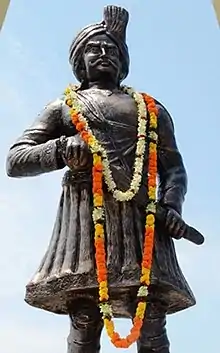Vishwanath Shahdeo
Vishwanath Shahdeo (12 August 1817 – 16 April 1858) was the king of Barkagarh estate and a rebel in the Indian rebellion of 1857. He and his followers attacked a force of the British East India Company in Ranchi and caused the British to flee. He was eventually caught, found guilty of treason and was hung from a tree along with his accomplices.[1][2][3][4][5][6]
| Vishwanath Shahdeo | |
|---|---|
| Thakur | |
 | |
| King of Barkagarh estate | |
| Predecessor | Raghunath Shahdeo |
| Successor | Late Thakur Kapil Nath Shahdeo »Late Thakur Jagnnath Nath Shahdeo »Late Thakur Devendra Nath Shahdeo »Late Thakur Bagleshwar Nath Shahdeo »Thakur Navin Nath Shahdeo(Presently) |
| Born | 12 August 1817 Satrangi, Barkagarh estate |
| Died | 16 April 1858 (aged 40) Ranchi, British India |
| Spouse | Baneshwari Kunwar |
| Issue |
|
| House | Barkagarh Estate Royal family (Nagvansi) |
| Father | Raghunath Shahdeo |
| Mother | Chaneshwari Kunwar |
Early life
He was born on 12 August 1817 in Satrangi, the capital of Barkagah estate in Lohardaga. He was a member of the Nagvanshi family. Barkagarh state was granted to Nathan Shah who was grand father of Vishwanath Shahdeo for maintenance by the Nagvanshi maharaja of Chhotanagpur.[7]
Role in 1857
Thakur Vishwanath Shahdeo was anti-British and anti-missionaries. The British had established civil headquarters in Ranchi, and military headquarters of the Ramgarh Battalion at Doronda, without the consent or approval of Barkagarh zamindar. Later German missionaries established a church also, thus the sanctity of the Jagannath temple was believed to be violated and zamindar of Barkagarh were virtually surrounded by outsiders.[8] He disliked the authoritarian way of functioning of the officials. The Christian Kol tribals had taken forcible possession of his lands. They were encouraged in this by the Christian missionaries. When he complained to British officials, they paid no heed and simply ignored him.[7] The rebels in South Bihar asked him to lead them and he readily accepted this offer. He organised a Mukti Vahini (peoples army) with the assistance of nearby zamindars including Pandey Ganpat Rai, Tikait Umrao Singh, Sheikh Bhikhari, Jaimangal Singh, Nadir Ali Khan, Brij Bhusan Singh, Chama Singh, Shiva Singh, Ram Lal Singh and Bijai Ram Singh.[7]
References
- "Tributes paid to Pitthoriya martyr Thakur Vishwanth Sahdev". jharkhandstatenews.com.
- "Raghubar pays tributes to Thakur Vishwnanth Sahdeo on his birth anniversary". uniindia.com.
- "CM pays tribute to Sahdeo on his birth anniversary". avenuemail.com.
- "झारखंड के प्रमुख व्यक्तित्व – राजा ठाकुर विश्वनाथ शाहदेव 1817 -1858 ( 16 अप्रैल )". hamarjharkhand.com.
- "अमर शहीद ठाकुर विश्वनाथ शाहदेव". vikaspedia.in.
- "16 अप्रैल- बलिदान दिवस 1857 के महानायक विश्वनाथ शाहदेव जी. वो योद्धा जो रियासत का राज छोड़ युद्ध किये और प्राप्त की अमरता". dailyhunt.in.
- Mathur Das Ustad (1997). "The Role of Bishwanath Sahi of Lohardaga district, During the Revolt of 1857 in Bihar". Proceedings of the Indian History Congress: 493–500. JSTOR 44143953.
- Asha Mishra; Chittaranjan Kumar Paty (2010). Tribal Movements in Jharkhand, 1857-2007. Concept Publishing Company. pp. 85–. ISBN 978-81-8069-686-2.